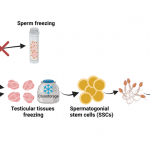NBC newsman Tom Brokaw announced this week that he is being treated for multiple myeloma, a form of cancer that affects the plasma cells in bone marrow. Mutiple myeloma is the most common type of plasma cell cancer and Brokaw says he is optimistic about his prognosis.
Mounzer Agha, M.D., director of the Mario Lemieux Center for BloodCancers and clinical director of the Stem Cell Transplant Program in the Division of Hematology-Oncology at the University of Pittsburgh Cancer Institute, answers some questions about multiple myeloma:
Q. What is multiple myeloma?
A. Multiple myeloma is a disease that affects the plasma cells in the bone marrow, and results in the expansion of these cells, which secrete an abnormal protein that adversely affects several organs.
A. Myeloma can cause anemia, abnormal kidney function, elevation of the serum calcium, bony pain and increased risk of infections.Q. How does myeloma affect the body?
Q. How is myeloma treated?
A. The treatment options for myeloma have increased dramatically over the past several years with the introduction of multiple new and highly effective drugs. The standard first-line treatment option now consists of a combination of three drugs (Bortezomib, Lenalidomide and Dexamethasone). Presently, all patients are also offered autologous stem-cell transplantation after that. Some patients, depending on their clinical presentation, may need radiation therapy.
Q. What is stem-cell transplant?
A. Hematopoietic stem cells reside in the bone marrow, and they are the cells that generate all blood elements. In autologus stem-cell transplantation, the patient’s own stem cells are harvested from the blood. The patient then receives high-dose chemotherapy designed to eradicate all the cancer cells. The previously harvested stem cells are then administered back to the patient to reconstitute the immune system.
Q. Is stem-cell transplant necessary?
A. This is a very important question. All prior studies have indicated a much better outcome with the stem-cell transplant in multiple myeloma. However, this question is being re-examined and we at the Mario Lemieux Center for Blood Cancers will have a new clinical trial examining exactly this question.








